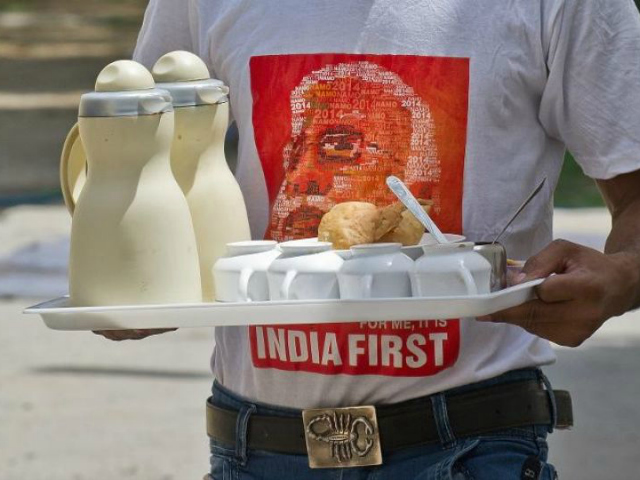
While Indians wait for the official results of their just-completed 2014 national election to be announced Friday, all eyes and expectations now fall upon the man everyone is certain will be the next Prime Minister of the world’s largest democracy: free-market proponent Narendra Modi, leader of India’s conservative Bharatiya Janata Party (BJP) and governor of India’s Gujarat state.
All six of India’s major exit polls, released as the final votes were cast Monday, point to fundamental change in how Indians now demand to be governed. If their predictions of an historic BJP victory coupled with a humiliating loss for India’s ruling Congress party hold up (Indian exit polls have made a botch of things with past predictions), India could be about to enter an extraordinary era of dynamic growth enabling it to take its place alongside the United States as a global superpower of free markets and free peoples.
If the BJP does win a victory big enough to allow its leader to build a government that can act on its promise to spur rapid economic growth and encourage foreign investment by dramatically shrinking the size of India’s massive and corrupt government, hundreds of millions more Indians could find themselves catapulted from poverty into the world’s largest middle class.
To form a government Modi needs at least 272 seats in India’s lower house of parliament. If his own BJP doesn’t win that many seats outright, he will need to build a coalition with any of the number of smaller parties expected to win seats. Estimates indicate Modi’s BJP could easily surpass the magic number of 272 seats and form a government without adding coalition partners.
Most analysts and even hints from Modi himself suggest that majority or not, he will opt to build as broad a free-market coalition government as he can without limiting his ability to implement his promised reforms.
Not only, as the adage goes, is India too big for any one person ever really “run,” it is too big and diverse for any single national institution to run; that includes parliament. So to rule as effectively as he hopes, Modi will need more than just a majority in parliament’s lower house. His fundamental reforms will need some way to win the consent of India’s less powerful upper house where he is unlikely to have a working majority.
In addition to its unwieldy national government, India has strong and diverse state governments whose interests might be best appeased by forming a larger and wider coalition. Assuming that the corrosive influence of India’s long dominant Congress Party and its ruling elites are not excised completely from India’s political calculus, Modi and his allies will need to find some way to keep Congress at bay. The more allies Modi has with him, goes the thinking, the fewer potential allies Congress might be able to rally against Modi and the BJP government.
The same establishment media in India and abroad that for so long tried to marginalize Modi and his appeal by portraying the self-made Hindu conservative as some kind of dangerous right-wing extremist is already changing tact to claim he needs to listen to their advice on how best to lead. He will need to “change style,” huffs The Economist, “from the aggressive figure on the campaign trail who traded insults and sneered at rivals.”
Many think the elite media’s attempts to characterize Modi as a “Hindu extremist” is part of a piece to lessen the criticism directed toward Muslim extremists in India and outside by creating a morally equivalent Hindu extremism. The only problem with this approach is that it misses one of the key organizing principles of Hinduism: that there is no key organizing principle.
Because India’s nearly one billion Hindus worship so many different gods and reverse so many different and often conflicting religious texts, the world’s third largest religion enjoys no universally accepted method of either practicing or interpreting the faith; thus there are few rules or principles. For a government to try and enforce Hinduism is about as unlikely a source for centralized extremism as one can imagine.
Herein lies the rub, since it has been through their long and successful patronage of India’s long ruling Congress Party that India’s 150 million Muslims have been afforded so many privileges that have rankled so many of India’s majority Hindus. “Positive discrimination” laws, i.e. Muslim affirmative action, have helped Muslims in India get and hold government jobs at far higher rates than Indian non-Muslims. Not only are India’s Muslims granted the authority of governing themselves using Sharia law, Muslims in India are granted relaxed entry standards to attend Indian colleges and universities and are even entitled to government-funded religious pilgrimages to Mecca – all paid for, of course, by India’s non-Muslim majority.
A complete defeat for India’s Congress party could mean a very different, less privileged reality for Indian Muslims. The unspoken fear, of course, seems that India’s Muslims will not take kindly to their loss of special rights or privilege. In short, the elites seem terrified of Muslim violence and are seeking to head it off by casting aspersions on Indian Hindus in general and their presumed “leader,” Narendra Modi, in particular.
It matters not that Modi’s campaign was devoid of any of the “Muslim-baiting” of which he was so often accused. It is reported so often that Modi is loathed and reviled by India’s “non-Hindus” that one would be forgiving for thinking India’s election was fought on sectarian grounds.

COMMENTS
Please let us know if you're having issues with commenting.